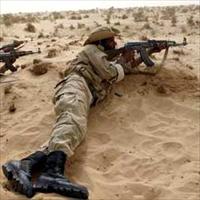CHAD: Wounded soldiers crowd hospitals as fighting intensifies

Fighting between the Chadian army and rebels has intensified in the east of the country and hospitals in the eastern regional hub Abeche and in the capital N’djamena are filling up with wounded soldiers.
“The Chadian military hospital in N’djamena is now full,” an army officer told IRIN.
Between 200 and 300 wounded have been moved from Abeche to the capital this week, another source said. No civilian casualties have been reported.
The hospital is normally open to the public but since 28 November the army has closed it off and has increased the number of troops guarding the building. Wounded soldiers are also being treated at public hospitals in N’djamena.
The fighting is now mostly in the mountainous area which straddles the border with Sudan called Hadjar Marfaine, according to a diplomat who is closely monitoring the conflict in Chad’s eastern provinces.
Speaking on the condition of anonymity the official confirmed that the fighting between the army and the rebel Union of Forces for Democracy and Development (UFDD) shifted there from where it had started earlier in the week farther south near Farchana, less than 100km from Abeche and near two major refugee camps, Treguine and Bredjing.
No information about the condition of the rebels has filtered out of the remote region, but the army claims it has killed and wounded “hundreds” of fighters.
Versions of events
The UFDD has already issued a statement on the Internet claiming the army has suffered the heaviest losses. The government has given a different account, claiming it has won a major victory.
“Those rebels who escaped the previous conflict [presumably around Farchana] were caught in Hadjar Marfaïne and completely decimated,” government spokesman Hourmadji Moussa Doumgor said on 28 November.
He also said that the rebels’ leader, Mahamat Nouri, had been forced to flee across the border to Sudan by foot. The ministry for foreign affairs issued a communiqué on 27 November saying that it had summoned the Sudanese ambassador in N’djamena because “Sudan is partly responsible for sheltering Chadian armed combatants”.
Humanitarian organisations are not pulling out of their sites near the fighting but some are moving more supplies into the area in case they have to pull out in the near future.
“There are organisations that are removing international staff but local staff continue to keep things going,” said Eliane Duthoit, head of the UN Office for the Coordination of Humanitarian Affairs (OCHA) in Chad. “In general the policy is to have as few staff in the area as possible.”
EU/UN mission
The fighting comes ahead of the deployment of a European Union-led UN force for Chad and Central African Republic, called MINURCAT. It was meant to deploy in November to protect civilian populations in the conflict zones but it is unlikely to begin before January.
The former colonial power France is the largest contributor to the peacekeeping mission although French troops have been supporting the Chadian army.
The rebels say the French are not neutral. “They have come to declare war on the people of Chad,” Albissaty Saleh Allazam, a rebel spokesman based in the Senegalese capital Dakar said in a statement on 30 November.
Some in the international community are also concerned about France’s neutrality in the EU force, which is known as EUFOR. According to the French newspaper Le Figaro, the defence ministry of Austria, one of the contributors, is concerned that French troops represent “a direct danger to EUFOR of armed conflict”.
An altogether different concern but just as disturbing to humanitarian officials is that support and equipment to the peacekeepers has been insufficient.
"Not even one helicopter has been offered by any EU country to support this force," Tawanda Hondora, deputy director of Amnesty International’s Africa programme, said in a recent communiqué.
"The lives of thousands in eastern Chad, Central African Republic and Darfur are being put at risk because of a failure of UN member states to pledge and deliver ground and air transport equipment so necessary for them to carry out their peacekeeping work safely and effectively."
 Back and Next - Back and Next
Back and Next - Back and Next See Also - See Also
See Also - See Also